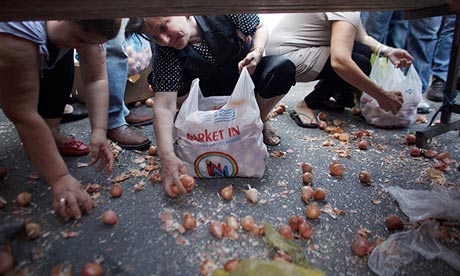Welcome to DU!
The truly grassroots left-of-center political community where regular people, not algorithms, drive the discussions and set the standards.
Join the community:
Create a free account
Support DU (and get rid of ads!):
Become a Star Member
Latest Breaking News
General Discussion
The DU Lounge
All Forums
Issue Forums
Culture Forums
Alliance Forums
Region Forums
Support Forums
Help & Search
General Discussion
Related: Editorials & Other Articles, Issue Forums, Alliance Forums, Region ForumsScarcity: Why Having Too Little Means So Much by Sendhil Mullainathan and Eldar Shafir – review
http://www.theguardian.com/books/2013/sep/07/scarcity-sendhil-mullainathan-shafir-review
People crouch to collect leftover vegetables in Athens: ‘scarcity of all kinds remodels patterns of thinking’. Photograph: Bloomberg/Getty Images
In a world increasingly polarised by wealth, the efforts to find a metaphor that unifies rich and poor, a shared humanity, if you like, has become both a lucrative and a slightly desperate publishing enterprise. Most of the academic traffic is concentrated at the busy crossroads between economics and psychology, where a nudge is as good as a blink. The idea that we are defined by and subject to market forces is taken as a given in this work; the interest lies in the gap between the economist's faith in rational decision-making and the psychologist's stacked-up evidence of our less than rational behaviours: in the exposure of our almost comical inability to understand risk and reward and to do what is best for us.
This gap was first comprehensively explored in the pioneering work of Daniel Kahneman and the late Amos Tversky, through their Nobel-prize winning analysis of how man (and woman, but mainly man) is anything but a creature of logic in market places of all kinds. Kahneman's recent bestselling precis of his life's work, Thinking, Fast and Slow, was a catalogue of examples of people using the wrong kind of analysis when confronting pivotal problems: relying on instinct when precise weighing of probabilities would be crucial, and vice versa. The seductive tone of Kahneman's writing comes in part from his understanding that no one is exempt from these failings. When I interviewed him about his ideas, he observed that the most useful subject for his study of internal biases and wonky reasoning had always been himself. Though he spent a lifetime proving the fundamental weakness of human beings in predicting the outcomes of any relatively complex choice, it happily didn't stop him making all sorts of errors of judgment in his own life.
Scarcity, the latest of the post-Kahneman adventures into this behaviourist world, comes with a quoted tribute from the master: "the finest combination of heart and head that I have seen in our field". Some of that dichotomy is a result of this book being a collaboration between another distinguished double act: a Harvard economist and a Princeton psychologist. The duetting professors present their adventures in metaphor as a kind of quest, though it is not always clear who is Quixote and who Sancho Panza. Their journey begins with the sort of revelation common to all such quests, a leap from the personal to the universal. The hypothesis to be tested is this: do the patterns of behaviour they themselves show when under deadline pressure in busy academic lives bear relation to those displayed by those billions of people in the world struggling to survive on minimal resources? In other words, do the stressed-out time-poor of the west have common cause with the actual dollar-a-day poor of the developing world? If they do, it is Mullainathan and Shafir's contention that the link between these two states is "scarcity".
If that link sounds tendentious, or even arrogant, then the American professors have no end of smart studies to back it up. It is, to begin with, their provable belief that "scarcity captures the mind", and it doesn't matter whether the absent resource is time or food or money. Some of this understanding is not new: a 1946 study of hunger (prompted by a need to understand and feed Europe's starving after the war) among American volunteers revealed not only the obvious – that, faced with starvation, food of any kind would be eaten and plates licked clean – but also that the brain was hijacked entirely by this need. The subjects of the study who watched movies were interested only in the scenes in which food was mentioned; when they talked they made plans to open restaurants or become farmers when the study was ended; they hoarded cookbooks.
InfoView thread info, including edit history
TrashPut this thread in your Trash Can (My DU » Trash Can)
BookmarkAdd this thread to your Bookmarks (My DU » Bookmarks)
1 replies, 643 views
ShareGet links to this post and/or share on social media
AlertAlert this post for a rule violation
PowersThere are no powers you can use on this post
EditCannot edit other people's posts
ReplyReply to this post
EditCannot edit other people's posts
Rec (1)
ReplyReply to this post
1 replies
 = new reply since forum marked as read
Highlight:
NoneDon't highlight anything
5 newestHighlight 5 most recent replies
= new reply since forum marked as read
Highlight:
NoneDon't highlight anything
5 newestHighlight 5 most recent replies
Scarcity: Why Having Too Little Means So Much by Sendhil Mullainathan and Eldar Shafir – review (Original Post)
xchrom
Sep 2013
OP
freeplessinseattle
(3,508 posts)1. Even when consciously choosing to starve this happens
Many years ago I went through an anorexic phase, and even though I never was into actually cooking (still am not![]() I would read cookbooks like a Playboy textbook, and copy down recipes I never intended to make.
I would read cookbooks like a Playboy textbook, and copy down recipes I never intended to make.
Later when I learned more about my illness I found out that is a common behavior, as are other interesting parallels.